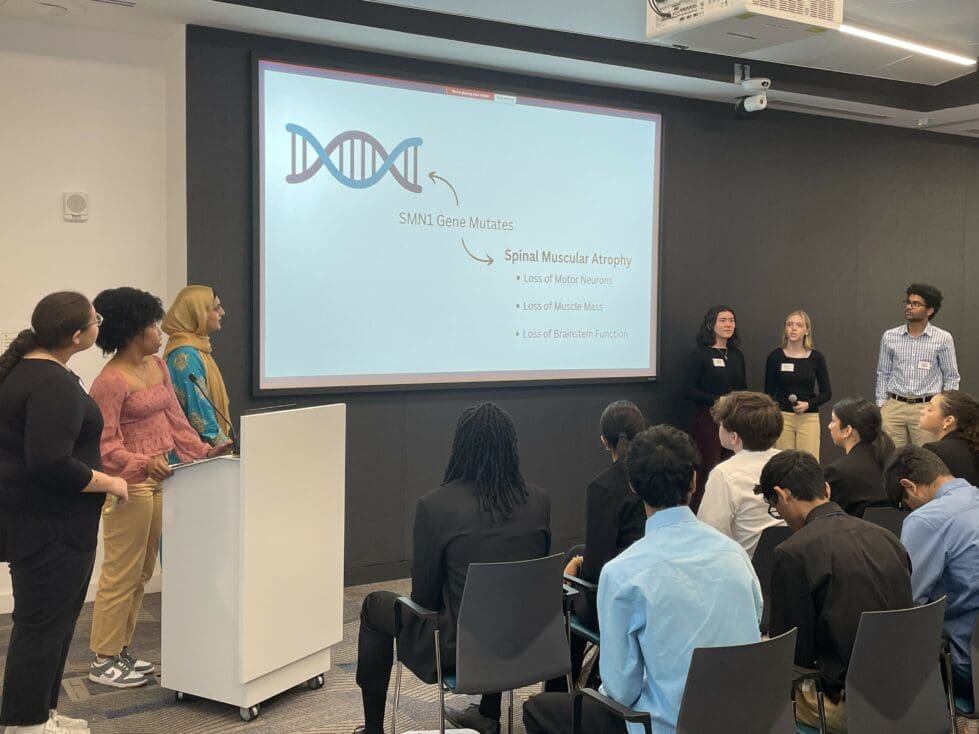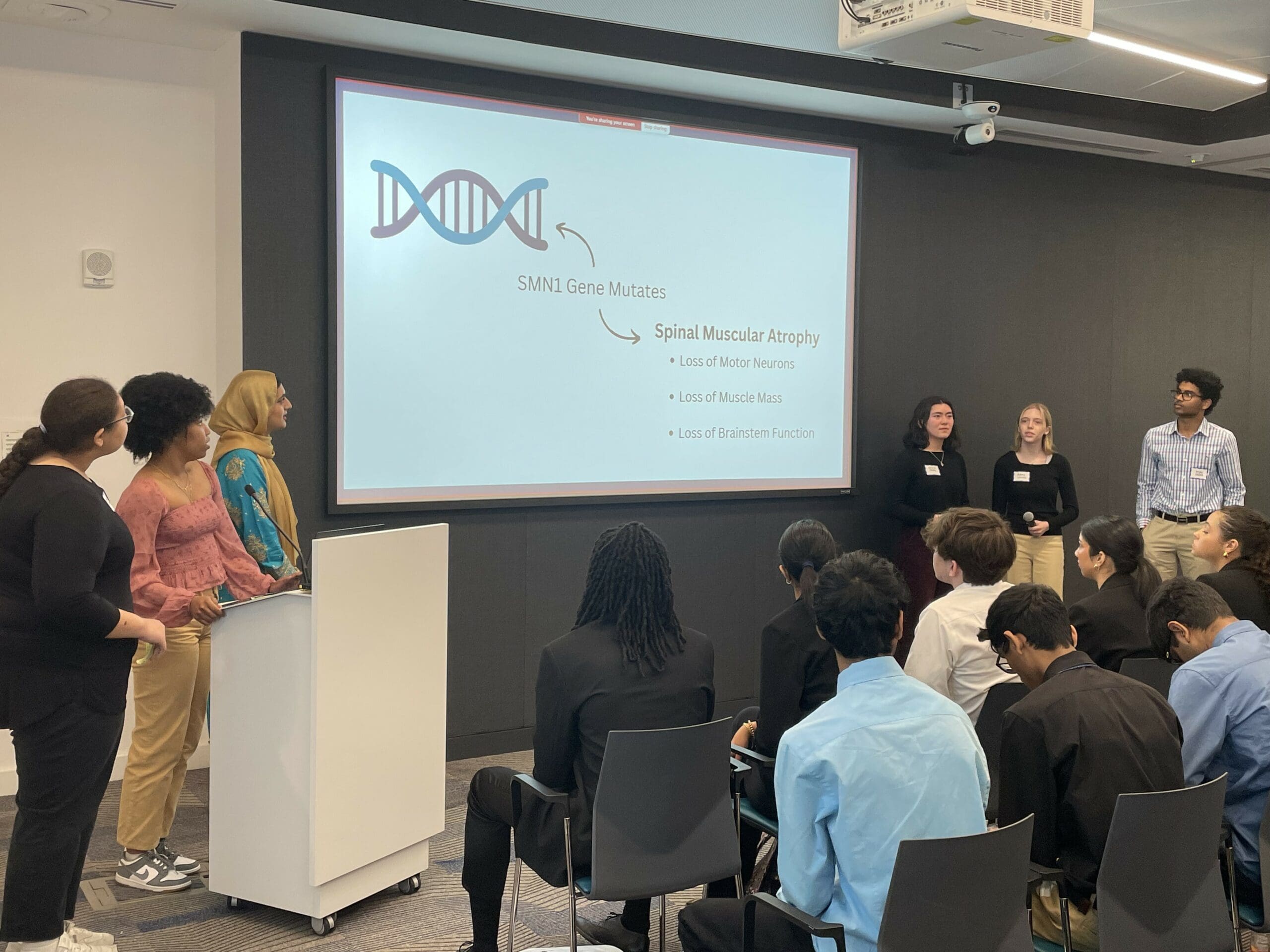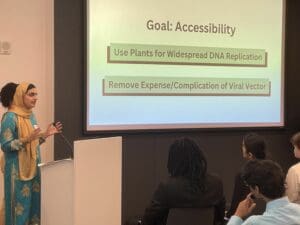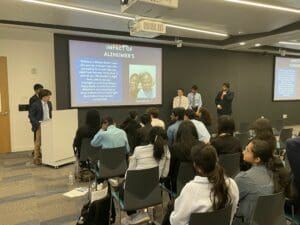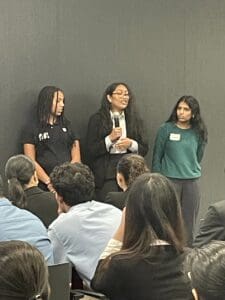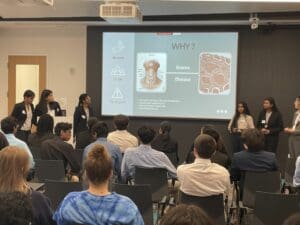Students from the Charter School of Wilmington said a new partnership with a national biopharmaceutical institute has helped them find their career path of the future.
“Prior to this program, I wasn’t entirely sure what within biology I wanted to focus on for my career and major, but I think this definitely encouraged me to pursue biopharma or biotech, something related to that,” said Arya Gupta, a junior at Wilmington Charter.
Gupta is one of 65 students involved in the bioLOGIC Program created by the National Institute for Innovation in Manufacturing Biopharmaceuticals (NIIMBL), which is headquartered in Newark on University of Delaware’s campus.
In that program, students work in teams of four to six to:
- Identify a real-world problem
- Conceptualize an advanced product solution
- Create a business model around the product
- Build a pitch deck and three to four minute pitch they will deliver to a panel of representatives in a professional-style setting
Kathie Young, workforce committee coordinator and project manager at NIIMBL, said it’s like a “Shark Tank” for biopharmaceutical products.
“The goal was to get around 20 students, and we had in the first initial meeting, over 75 students come, and we ended up taking 65 of those students,” said Michael Valenti, a science teacher and science department chair at the charter who coordinates the partnership.
Students committed to an eight-week process in which they met outside of the school every Monday from 2:15 p.m. to 3:15 p.m.
Wilmington Charter is the only school in Delaware to be part of the bioLOGIC Program, which was also piloted in North Carolina in 2022.
Gupta, whose team won in Wilmington Charter’s first year of the program, helped develop a monoclonal antibody for IgA nephropathy which is a leading cause of chronic kidney disease and young adults.
Monoclonal antibodies are lab-made immune system proteins meant to stimulate the immune system, treat and diagnose diseases, including cancer and other infections.
Bhavin Yarlagadda, a junior, and his team developed a gene therapy product to treat Alzheimer’s disease.
“What I really enjoyed was the fact that they gave us the freedom to actually approach whatever issue that we chose,” he said. “We got to approach it from whatever avenue we wanted as long as it involved biopharmaceuticals, so for us, we kind of branched out.”
While in its infant stage, NIIMBL hopes to expand the program next school year into more schools.
“The program is designed to be really flexible, so you could do anything from an intensive summer-camp-type scenario, which they’ve done in North Carolina, and you could do it for say 40 hours a week, and then finish the project,” said Jennifer Mantle, the regulatory committee coordinator and technical director at NIIMBL.
Another option, she said, is to incorporate bioLOGIC into the school year through a specific class, or an after-school model like Wilmington Charter chose.
Its flexibility allows teachers to tailor it to the specific needs and wants of students and their learning objectives, Mantle said.
She said the institute isn’t focused on specific metrics and rather wants an organic growth of the program driven by interest from students, teachers and administrators.
“As someone who’s interested in medicine and pharmaceuticals, we’ve learned biology and chemistry in school, but I thought it was really valuable to use the knowledge that we’ve learned and kind of apply it to a more professional setting,” said Adarsh Ramamurthy, a junior.
He said getting to see start to finish, from the research to developing a business model, he was able to learn aspects of the industry one might not think about in a traditional class setting.
He also enjoyed getting feedback from professionals during the final pitches.
Margaret Olson, a science teacher at Wilmington Charter, explained that NIIMBL provides a sort of guide to teaching the program in which it’s very hyper focused and each week they meet, they focus on a few pages of the guide and a certain aspect of the product development process.
Mantle joked that while some of the groups’ products were very innovative and she’d love to actually bring them to market, part of what the students learned in the program is how incredibly expensive it is to mass produce a product and bring it to market.
“It takes billions of dollars and tens of years to bring a drug to market,” she said. “So, perhaps some of these bright young minds will go on to work at pharma companies and bring those ideas to life but at this point in time, no.”
Xuan Bui, the director of faculty and student life and the charter, said the end goal is to get students outside the traditional learning structure of the classroom and immerse them in a simulated experience.
She said the appetite for this program is evident by the surprisingly large number of students who participated in year one of it, and said there is great value for them to hear back from industry experts on pitch day.
“We definitely want to continue, we’ve talked about doing a fall and a spring session,” Bui said. “This was all done after school, so it took eager students to stay after school and work on it.”
On the NIIMBL side, Mantle said the institute wants to build relationships with local schools.
“The charter school has been fantastic to work with and I’m hoping that we can work with some others and maybe help some teachers be able to implement this in their classrooms,” she said, “and maybe sometime in the future expand beyond just Delaware and North Carolina to other states, and maybe train program managers.”
But, that’s a future problem, she said.
“As far as the outcomes of the program, with every implementation, I think it’s really important that we introduce the students to a real-life application of the things that they’re learning in school, and we introduce them to potential career options,” she said.
If a student is majoring in biological sciences, everyone is seemingly pre-med, Mantle said, but people don’t realize that degree can be used for a myriad of other jobs and careers, which is what she hopes the bioLOGIC shines light on.
“Biology is definitely my favorite subject, and I’m still kind of thinking about what exactly I want to do, maybe medicine or maybe pursue a pharmaceutical research sort of role,” Ramamurthy said. “I think it was a good opportunity to just dip my toes into the biopharma industry.”
An AP Bio class, Mantle said, might be more interested in just talking about the health problem and the solution.
A business class, she said, could focus on the product market but without all the science background.
But, she said, bioLOGIC brings both together.
“I most enjoyed getting to see just how in-depth the process of developing biopharmaceuticals,” Gupta said, “and like learning the amount of money, the effort, the time that goes into this. We see ads on TV all the time, you may not think about how much it goes into, producing all these drugs that save lives.”


Raised in Doylestown, Pennsylvania, Jarek earned a B.A. in journalism and a B.A. in political science from Temple University in 2021. After running CNN’s Michael Smerconish’s YouTube channel, Jarek became a reporter for the Bucks County Herald before joining Delaware LIVE News.
Jarek can be reached by email at [email protected] or by phone at (215) 450-9982. Follow him on Twitter @jarekrutz
Share this Post


